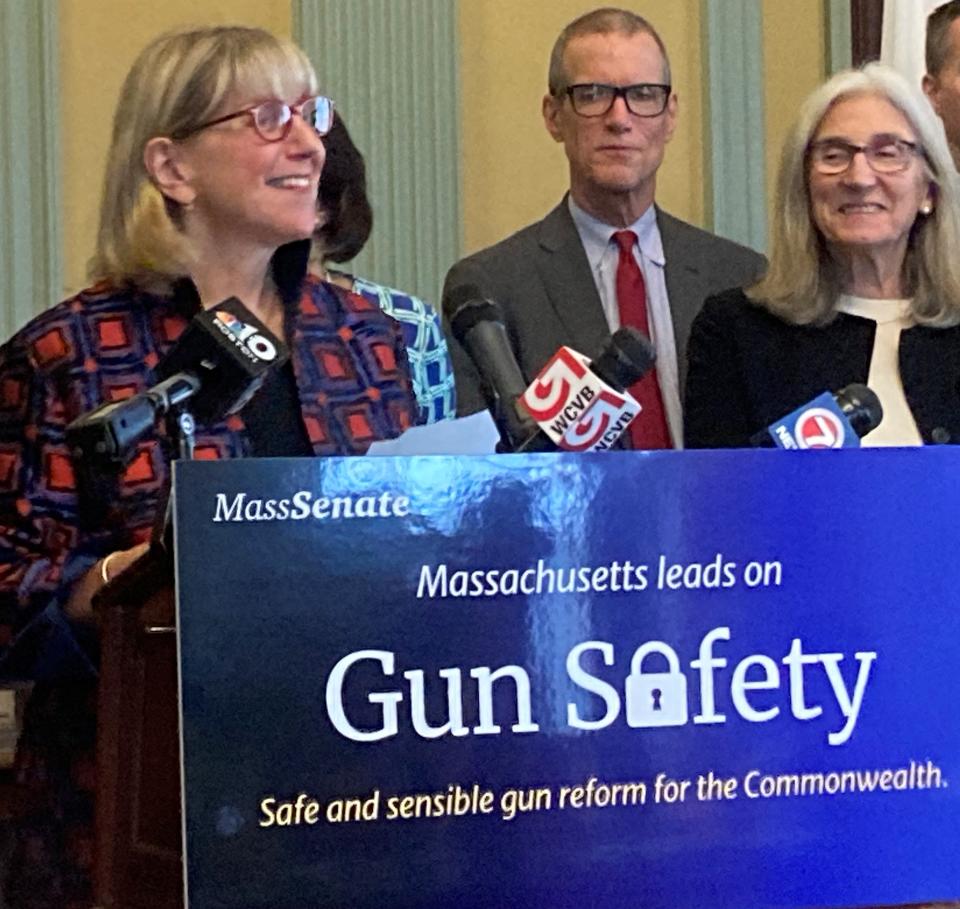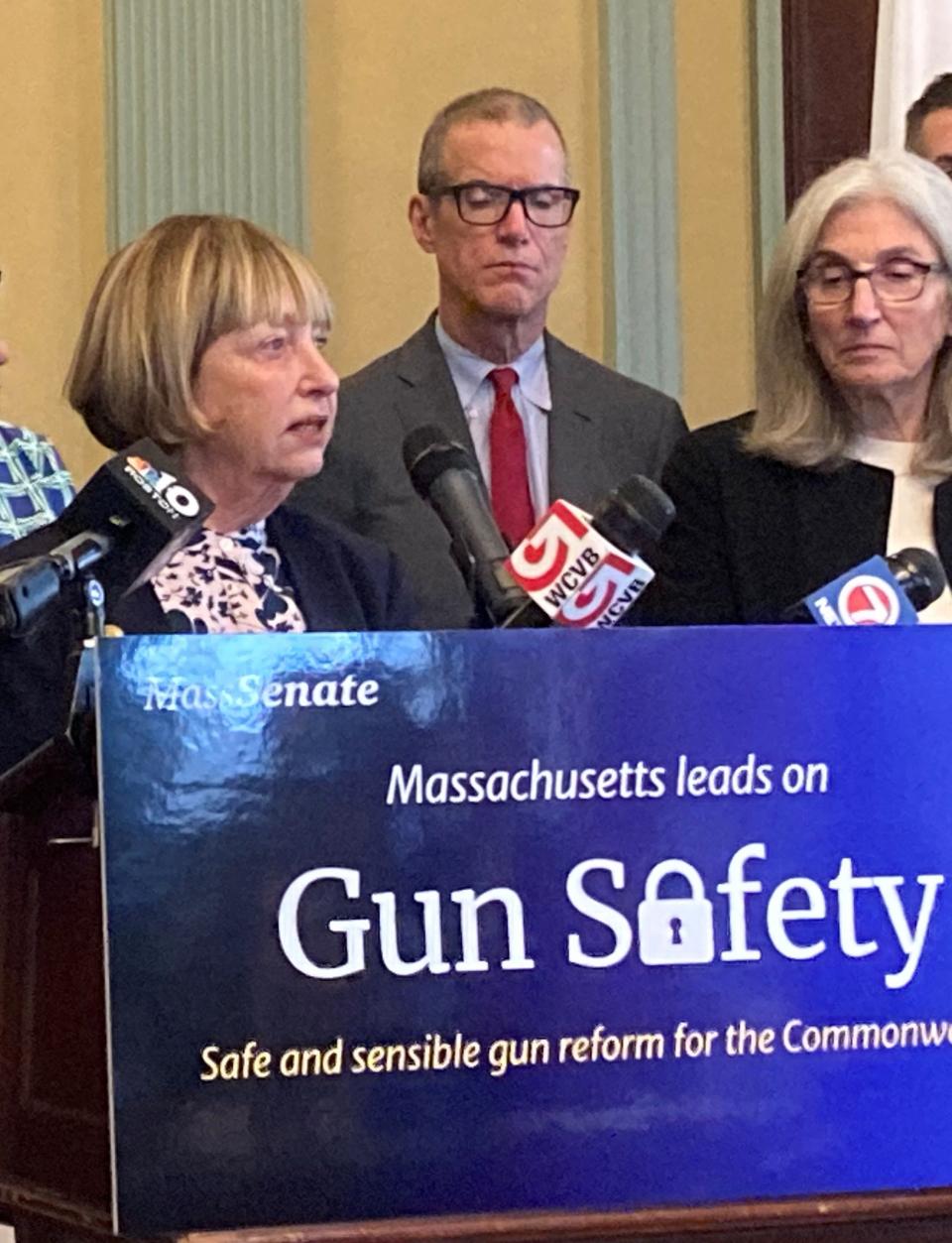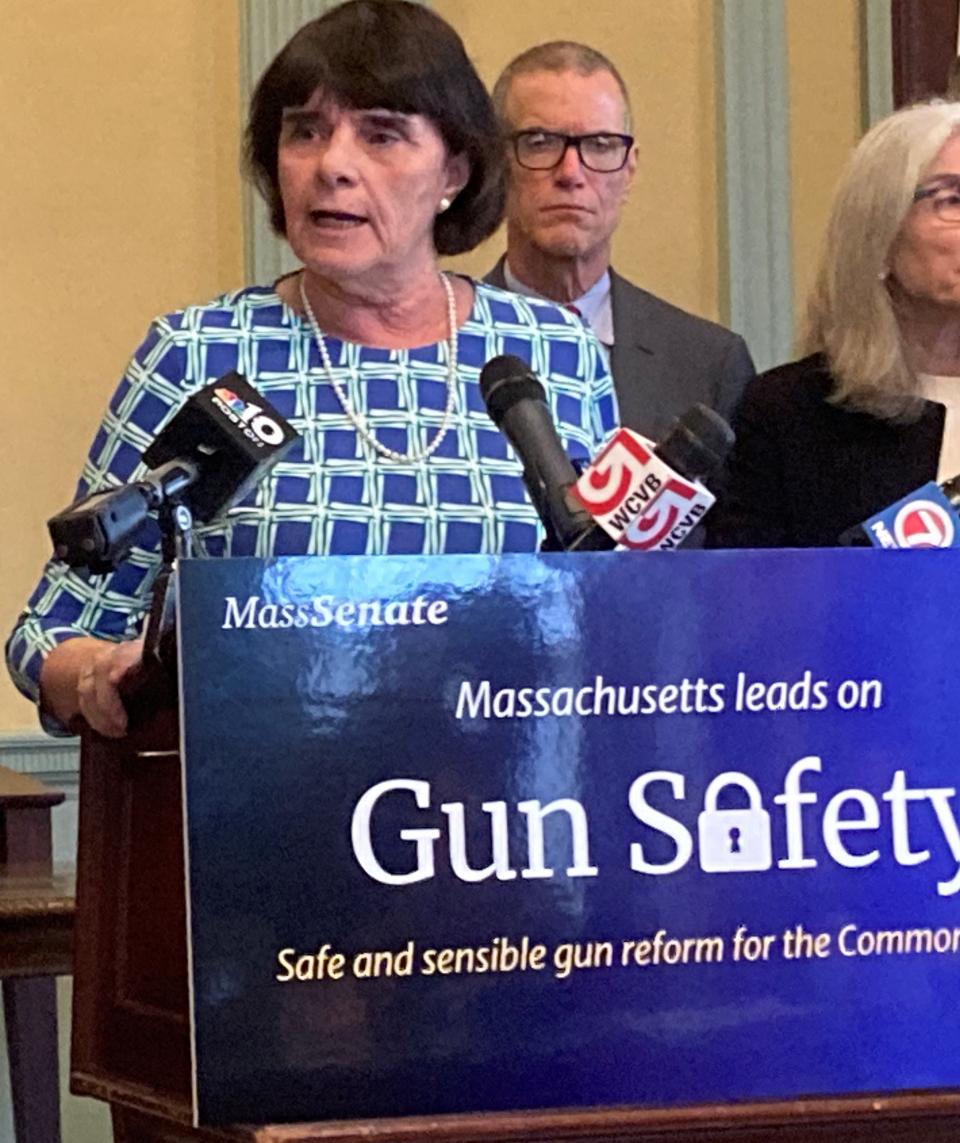Senate reveals own version of controversial gun safety reform bill; vote expected Feb. 1
- Oops!Something went wrong.Please try again later.
- Oops!Something went wrong.Please try again later.
BOSTON — Months after House legislators in Massachusetts unilaterally proposed, debated, amended and passed an omnibus gun control bill last October, state senators Thursday revealed their version of the measure, titled the SAFER Act, scheduled for a floor vote on Feb. 1.

In announcing the legislation, Senate President Karen Spilka, D-Ashland, said the proposal builds on the Bay State's strong record of gun safety, gun violence prevention and gun control laws, updating statutes to reflect new technology and changes in firearms and weaponry.
"Massachusetts is one the states with the lowest level of gun violence in the nation, thanks to our vigilance in updating laws that prevent the access to and use of deadly weapons," Spilka said in announcing the bill. "Massachusetts is and will continue to be a national model for gun safety laws."
The Senate engaged in “months of discussion,” with the stakeholders, including law enforcement agencies, the Attorney General’s Office, district attorneys, school administrators and leaders, gun safety and violence prevention advocates, gun manufacturers and both gun owner organizations and individual gun owners, Spilka said.
“These are commonsense policies aimed at reducing gun-related injuries and gun violence that don’t infringe on the rights of gun owners,” Spilka said.
Bill proposes civil liability for marketing, selling guns to minors
The Senate tackles the question of liability, barring the marketing and illegal sale of guns to minors and allows manufacturers to be held civilly liable if the practice leads to personal harm. Currently, firearms manufacturers enjoy near immunity from civil litigation.
Topping the list of reforms for the Senate was addressing the proliferation of “ghost guns,” firearms that are manufactured using kits, made with disparate pieces sold separately or even those created by a 3D printer. Those homemade arms tend to be unregistered and untraceable by law enforcement.

To address the untraceable weaponry, Senate Majority Leader Cynthia Creem, D-Newton, said Massachusetts would adopt the federal definition of a firearm and require all weapons and parts of firearms sold in Massachusetts to be etched with a unique serial number.
“If it does not have a serial number, it is not legal,” Creem said, explaining the frames, also called receivers, must be numbered and traceable. In the case of 3D printers, programs that are capable of creating a firearm would not be allowed in Massachusetts.
“This will go a long way to decrease the prevalence of ghost guns in Massachusetts,” Creem said.
Middlesex County District Attorney Marian Ryan said the bill will have an immediate effect on people’s lives.
Banning switches for automatic firing
“In two of my communities, Cambridge and Somerville, last year there were more than 20 shootings with ghost guns, mostly involving young people and causing catastrophic injuries,” Ryan said. Their survival, she said, can be attributed to their proximity to Boston and the city’s emergency medical system. “But even if they recover, they are never the same.”
The Senate also addressed other measures, including banning the ownership of devices that are used to convert a semiautomatic weapon to a fully automatic firearm. Known as Glock switches, selector switches and auto sears, they enable a weapon to be fired repeatedly without having to pull a trigger for every round fired.
“It’s not unusual for police to respond to a scene and find that more than 100 shots have been fired, sometimes in less than 10 seconds,” Ryan said. “The bullets go somewhere, into homes, cars, innocent bystanders.”
In some neighborhoods in her communities, it's common to see bullet holes riddling the clapboard siding of buildings at certain crossroads.
“This was the type of device used in the shooting at the Boston Caribbean Festival last summer that injured eight people,” Creem said. “The only goal of the devices is to make the gun more dangerous.”
The Senate bill would enhance the state’s Red Flag Law, an existing measure that requires licensed gun owners to surrender their permits and weapons if they are determined to pose an extreme risk to themselves or others. Under the proposed revisions, health care providers can petition for an extreme risk protection order if they have served the client in the last six months. The current law allows only family members and law enforcement to file those petitions.
The change would also preemptively bar people under an extreme risk order from applying for and receiving a permit to obtain and carry a firearm.

The proposed bill would plug existing gaps in laws pertaining to gun possession by residents accused of harassment and domestic abuse. While those accused of domestic violence or abuse are required to surrender their firearms, residents accused of harassment are allowed to keep theirs. That would change under the proposal.
Assault weapons would continue to be banned in Massachusetts, but the statute would be modernized to reflect changes in weaponry. And the proposed law would specifically ban firing a gun at buildings that are inhabited or “in use.”
What else would change under bill?
Other measures prohibit carrying firearms in sensitive places such as courthouses and state and municipal administrative structures. Police are exempt.
Mental health issues: Law enforcement agencies would be allowed access to mental health information such as involuntary inpatient hospital admissions and other factors.
Support for gun violence prevention and gun control advocacy groups in communities impacted by gun violence and communities of color: directing the Department of Public Health to develop a pilot program to promote gun safety awareness and firearms licensing education. Seeking federal funding to support for gun violence prevention programs.
Data collection pertaining to trends in gun violence, gun sales and transactions, tracing weaponry, and information on gun dealers.
Tracking emerging firearm technology.
“The Massachusetts Chiefs of Police Association, which represents city, town and university police chiefs across the commonwealth, supports the concise firearms reform bill put forth by the Senate,” said Chief Eric P. Gillis, president of the Massachusetts Chiefs of Police Association.
This article originally appeared on Telegram & Gazette: Mass. Senate bill holds gun manufacturers liable in certain cases

